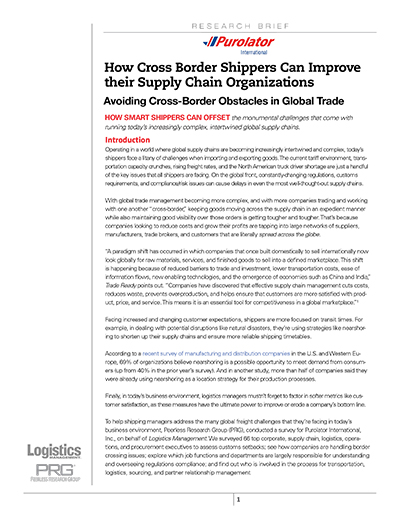New Research: How Cross Border Shippers Can Improve their Supply Chain Organizations
Avoiding Cross-Border Obstacles in Global Trade
Operating in a world where global supply chains are becoming increasingly intertwined and complex, today’s shippers face a litany of challenges when importing and exporting goods. The current tariff environment, transportation capacity crunches, rising freight rates, and the North American truck driver shortage are just a handful of the key issues that all shippers are facing. On the global front, constantly-changing regulations, customs requirements, and compliance/risk issues can cause delays in even the most well-thought-out supply chains.
With global trade management becoming more complex, and with more companies trading and working with one another “cross-border,” keeping goods moving across the supply chain in an expedient manner while also maintaining good visibility over those orders is getting tougher and tougher. That’s because companies looking to reduce costs and grow their profits are tapping into large networks of suppliers, manufacturers, trade brokers, and customers that are literally spread across the globe.
“A paradigm shift has occurred in which companies that once built domestically to sell internationally now look globally for raw materials, services, and finished goods to sell into a defined marketplace. This shift is happening because of reduced barriers to trade and investment, lower transportation costs, ease of information flows, new enabling technologies, and the emergence of economies such as China and India,” Trade Ready points out. “Companies have discovered that effective supply chain management cuts costs, reduces waste, prevents over-production, and helps ensure that customers are more satisfied with product, price, and service. This means it is an essential tool for competitiveness in a global marketplace.”1
To help shipping managers address the many global shipping challenges that they’re facing in today’s business environment, Peerless Research Group recently surveyed top corporate, supply chain, logistics and procurement execs on:
- how they assess customs setbacks,
- how their organizations are handling border crossing issues,
- which job functions and departments are responsible for regulation compliance, and
- who is involved in the process of transportation/partner relationship management.













